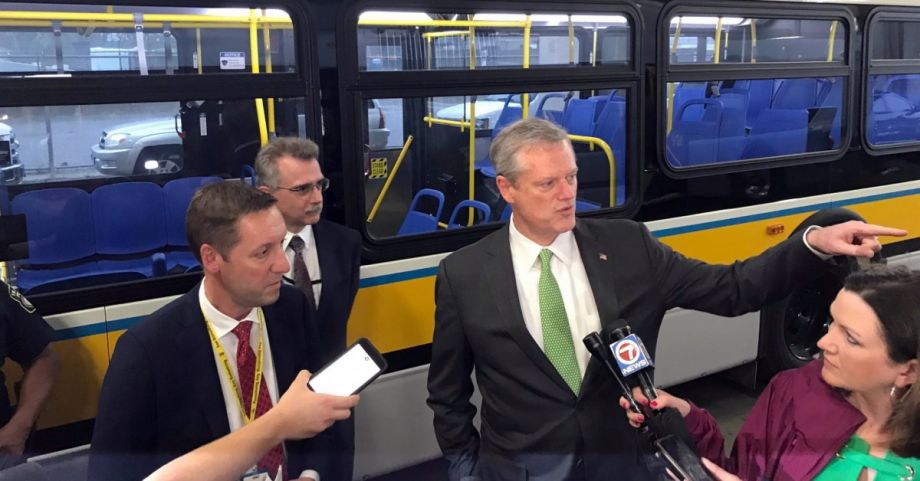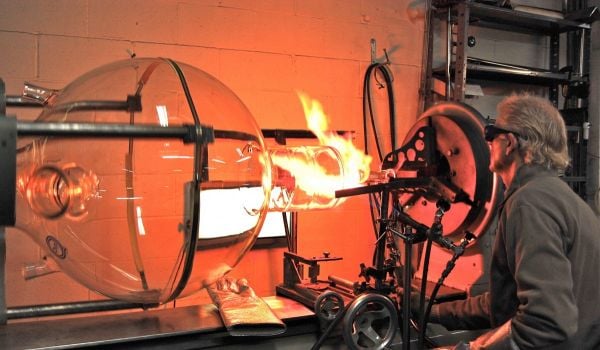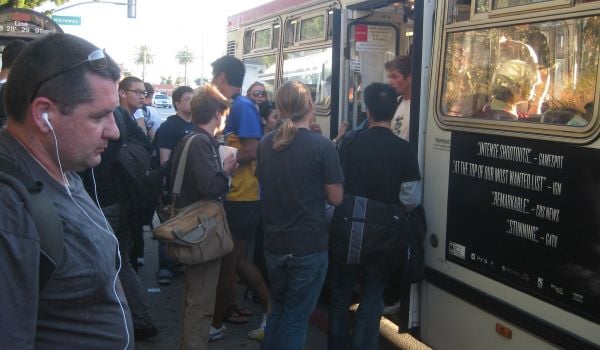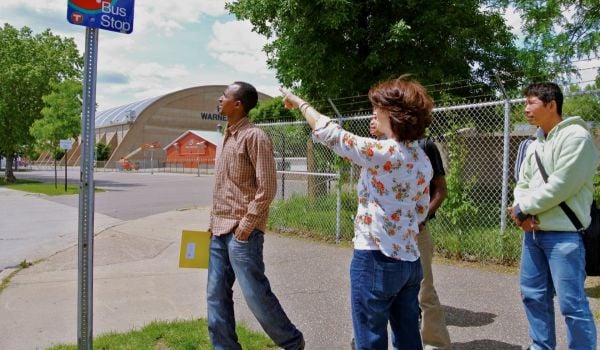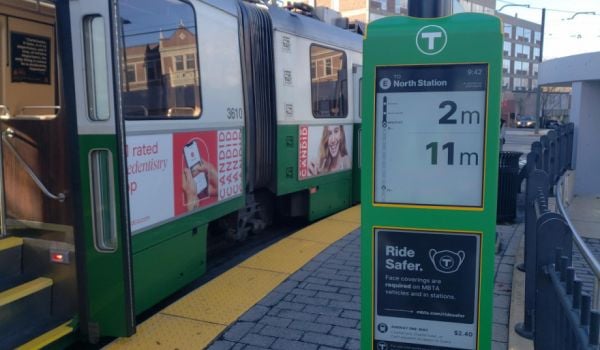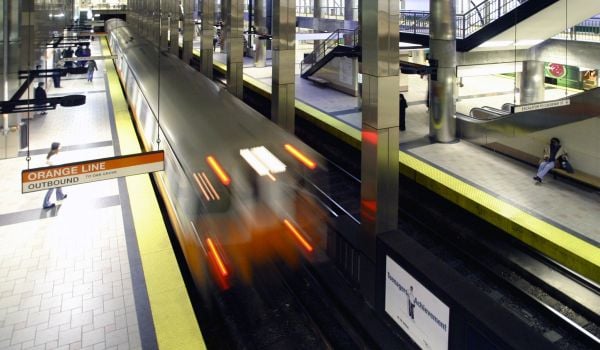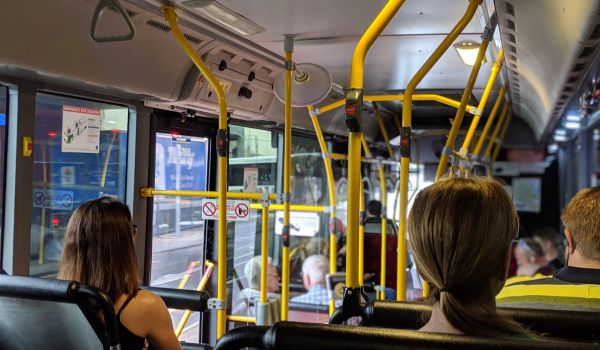It took almost two decades for San Francisco Muni’s transit fleet to become what it claims is the greenest in North America.
Muni already has a zero-emissions fleet of overhead-wire electric buses, streetcars, light rail vehicles, and cable cars; roughly half of its fleet of 1,200 vehicles emit pollutants. After studying alternative fuels as a condition of their last major diesel bus purchase in 2001, it began to add hybrid buses to its fleet in 2007. The agency eventually bought more to completely retire that diesel fleet last year. Its latest hybrids have a GPS-controlled engine that shuts off — moving entirely on electric power — in neighborhoods with high concentrations of low-income populations and poor air quality. Muni hopes someday to convert those hybrids into fully electric buses by simply removing the engine.
In 2004, Muni promised a fully zero-emissions fleet by 2020. But the battery-electric bus market was slow to mature, and the agency wasn’t comfortable buying buses that weren’t yet guaranteed to last, given the agency’s 700,000 pre-pandemic daily boardings and the city’s terrain. That may change when Muni begins testing three buses each from three of the major battery-electric bus manufacturers later this year. In the meantime, the agency is also buying 30 small hybrid buses that can navigate neighborhoods with tight turns and steep hills.
Agencies across the nation joined San Francisco over time to deploy hybrid buses to reduce their carbon footprint. While some agencies, including San Francisco, continue to buy hybrids, often as a stepping stone to electrification, other agencies have encountered maintenance challenges and decided to change course.
King County Metro, which serves the Seattle area mostly with hybrid buses and recently wrapped up a battery-electric bus pilot, plans to buy battery-electric buses with one exception: It will buy hybrid buses for its proposed RapidRide G Line, which will connect downtown Seattle with an east-central Seattle neighborhood and traverse extremely steep grades. “Current [battery-electric bus] technology offered would require on route charging at some location along the RapidRide G Line, [and] locating and installing chargers and infrastructure on the already crowded corridor is not currently feasible,” says King County Metro spokesperson Al Sanders.
The RapidRide G Line corridor is mostly served by zero-emissions electric trolleybuses, and King County Metro planned to operate the G Line with accordion versions of them. But the accordion trolleybuses King County currently uses cannot operate on steep grades, and designing and building trolleybuses specifically for the route would be extremely expensive and time-consuming. King County hasn’t decided whether or not to scale back zero-emissions service on the corridor which would compete with the G Line, and they plan to engage the public about possible service options about 18 months before it opens.
On the east coast, winter weather and outdated maintenance facilities complicate Massachusetts Bay Transportation Agency’s transition to battery-electric buses. The agency, which operates public transit in the Boston area, recently finished testing battery-electric buses on its Silver Line, which connects downtown Boston with Chelsea and the airport via a two-mile transit tunnel, where they found the buses struggled to operate in extreme cold. Their oldest facilities are also too small and cannot support the infrastructure needed to maintain a battery-electric fleet. Nonetheless, the MBTA plans to begin upgrading its facilities this year, and while they plan to buy hybrid buses for now, they’ll also execute a contract to buy electric buses, so they can start buying and using them immediately as the upgraded facilities come online.
All three agencies say their series hybrids, which are powered by a generator that is powered by an engine and predominantly used in stop-and-go traffic, deliver up to one and two-thirds times better fuel economy than the diesel buses they’re replacing. King County Metro and MBTA also report these same hybrids emitted 20% to 40% fewer greenhouse gas emissions compared to their diesels.
But some agencies, including Metro Transit, which serves the Twin Cities and has operated hybrid buses for almost 20 years, feel perturbed by how complicated they are to maintain. “The amplified number of wires and connections complicate troubleshooting and repairs, especially as the vehicle ages and has been subjected to many miles of jostling and corrosion in service,” says Metro Transit spokesperson Laura Baenen. Most of Metro Transit’s routes operate in smooth-moving traffic, and their hybrids use a parallel system, which are used by agencies that operate in these traffic environments and are powered by both an engine and a battery-powered generator, similar to a Toyota Prius.
Miami-Dade Transit, which serves Florida’s Miami-Dade County, also doesn’t have plans to buy any more hybrids because of how expensive it is to replace its batteries and voltage converters in their parallel hybrids. They’re instead buying buses fueled by compressed methane. “The new [compressed natural gas] fleet is helping generate a positive fiscal impact to the County by providing long-term fuel cost savings and reducing parts and labor costs for the repairs of older buses”, says Miami-Dade County Transportation and Public Works Spokesperson Luis Espinoza.
Similar challenges with maintaining their series hybrids, as well as because they were predominately assigned to faster-moving routes, are what led OCTranspo to retire them early shortly after they opened a new light rail route. “[Retiring the hybrids] allowed the City to reduce four types of buses down to three, reducing complexity for parts and supplies and simplifying operations overall,” says OCTranspo’s Director of Transit Operations Troy Charter.
While the Twin Cities’ Metro Transit hasn’t decided whether or not to continue procuring hybrid buses, the Metropolitan Council, which oversees Metro Transit, plans to execute two contracts to buy standard and accordion diesel buses for future replacement needs and to expand the region’s arterial rapid bus system. (This author was one of the founders of the Twin Cities Transit Riders Union, which lobbied against purchasing clean diesel buses in 2018; they are no longer involved.)
The agency thinks diesel buses can deliver fuel economy and greenhouse gas reduction benefits similar to hybrids, the oldest of which they retired early last year because their fuel economy was essentially similar to a modern diesel bus. “Modern diesel buses with features such as electric cooling fans and advanced transmissions with enhanced fuel-saving technologies can offer near hybrid-like fuel economy under certain conditions for substantially less cost,” says Baenen. They weren’t able to provide Next City with data to verify their findings at press time.
But despite the agencies’ difficulty with hybrids, they all want to eventually operate battery-electric buses. Metro Transit operates eight of them through a predominantly Black, low-income neighborhood northwest of downtown Minneapolis, and while the agency wants to get more, it has actively been looking for money to do so. Meanwhile, both OCTranspo and Miami-Dade Transit plan to buy their first electric buses over the next two years, with Miami-Dade committing to buy up to 100 electric accordion buses alone.
Even though battery-electric buses are starting to be more prominent in daily transit operations across the U.S. and Canada, it appears hybrid buses are here to stay.
Editor’s note: An earlier version of this article misstated that the Metropolitan Council has already executed the two diesel bus purchasing contracts. We’ve corrected this to note that the contracts are expected to be executed but haven’t yet been.

H. Jiahong Pan 潘嘉宏 (pronouns: they/them/佢/他) is a Minneapolis-based introverted freelance journalist who reports primarily on their lifelong passion: transportation issues. Find them on a bus of all types, the sidewalk, bike lane, hiking trail or perhaps the occasional carshare vehicle, camera and perhaps watercolor set or mushroom brush in tow, in your community or state or regional park regardless of season. If you can’t find them, they’re probably cooking, writing, curating an archive of wall art or brochures, playing board games, sewing or cuddling with their cat.

